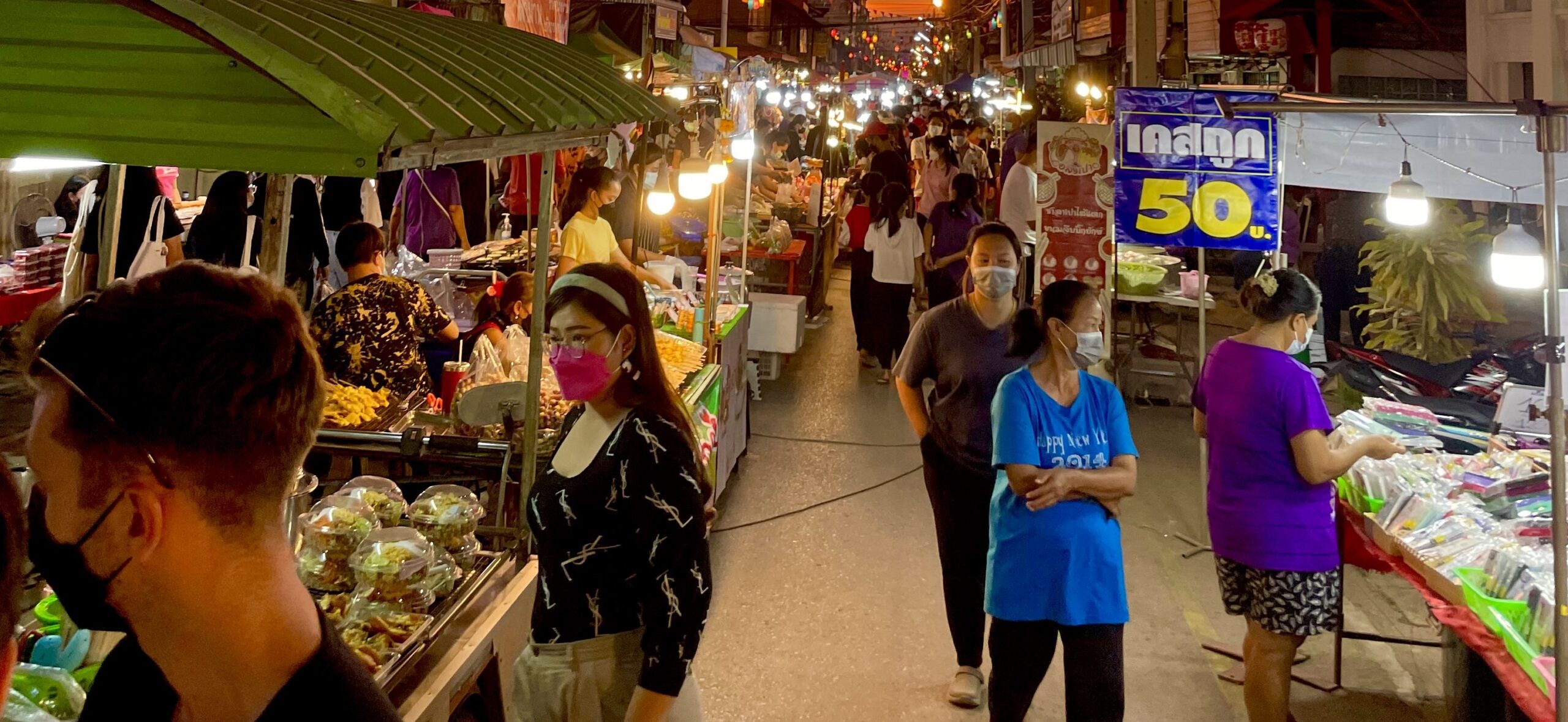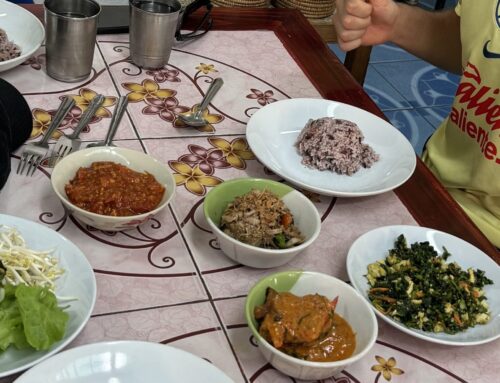By Josh Butterworth , Teacher in Phetchabun, Thailand
Moving halfway across the world can be daunting. Exciting as it may be, and it is, an inability to speak the native language while attempting to find your feet in an unfamiliar place can be a catalyst for anxiety and stress. Without the direct support of family or friends, feelings of isolation can develop. This can make the new city, town or village that you now call home, feel even further away from home. Some will encounter these issues straight away, others after a few weeks or months of arriving, and some never at all. The thrill of a new life in a foreign land, the reason you got on that plane, will hopefully dwarf the difficulties that sometimes arise. But having shipped my life east, twice, first to China in 2019 and more recently to Thailand, I have faced and overcome negative feelings about the place in which I found myself. There are ways to perpetuate the problems and ways to defeat them. In this article I will share with you the things I did to make my new home, home. I hope it can help you do the same.
I will refer predominantly to Thailand throughout and although some elements are unique, the principles are universal and apply anywhere on Earth.
Transport
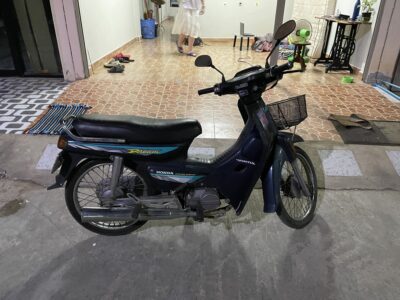 On arrival in a new land, a foreign and fascinating place that’s now home, an overwhelming desire to explore overcomes you. But with that often grows negative feelings of being overwhelmed, leading to hesitance and a questioning of what you’ve just got yourself into. Getting out of the house and exploring is the most effective, and only, way that you can remedy that. Confidence is key, and it will only flower when it’s fed with experience. Experience leads to confidence which leads to more experiences which leads to more confidence, and so on, you get the idea. But to get out and have experiences, you need transport.
On arrival in a new land, a foreign and fascinating place that’s now home, an overwhelming desire to explore overcomes you. But with that often grows negative feelings of being overwhelmed, leading to hesitance and a questioning of what you’ve just got yourself into. Getting out of the house and exploring is the most effective, and only, way that you can remedy that. Confidence is key, and it will only flower when it’s fed with experience. Experience leads to confidence which leads to more experiences which leads to more confidence, and so on, you get the idea. But to get out and have experiences, you need transport.
Whether you drive, ride or use public transport, moving throughout your own country is a doddle. It’s something we all take for granted. Having had a car in the UK for many years, and not, I’ve experienced the feeling of freedom and independence that comes with being able to go anywhere at any time. I’ve also felt the isolation that occurs when that ability is taken away. Arriving in Thailand I felt that same sense of helplessness that lingers when one lacks transportation, so I quickly set to rectify that. Travelling by foot will only ever get you so far, especially when it’s thirty-two degrees outside and the sun is beating down on your back. Luckily, there is one mode of transport synonymous with Thailand and southeast Asia that I highly recommend utilising. Even with closed eyes there’s no mistaking where you are, ignoring the pungent aromas of street food stalls and the intense heat, the sounds of gurgling mopeds are enough.
You may have preconceptions about mopeds and their safety. Granted, they can be dangerous, but so can riding a bike. Put simply, they’re somewhat essential if you live anywhere in Thailand other than Bangkok. Acquiring one is as easy as getting a bicycle back home and it seems like there are more of them than people. Renting is an option, easy and very cheap, but buying second hand and selling on in the future might be more financially savvy if your stay is longer than a few months. It goes without saying, wear a helmet and take time practicing before going onto the roads. I know many people who were wary about hopping on a moped for the first time but mastered it within a matter of days, if not hours. It really is easy. Possessing the ability to ride around in the sun with the wind cooling you down is liberating and will give you bags of confidence. Being able see, smell and hear life as you drive, then stopping at the side of the road to grab a bite, will make you feel like a local already and realise that this is where you belong. Transport is essential in life, in Thailand, transport means moped. If you really are anxious then that’s fine, but give it a go in a safe environment and see how you get on.
I ought to mention public transport too. Bangkok is not a place for beginner moped drivers, the traffic is crazy and so are the locals behind the wheels. In Bangkok and some other big cities such as Chiang Mai, public transport is your friend, although mastering it can be more of a challenge than learning how to drive a moped. Using buses, trains, motorbike taxis and so on will give you the same confidence and cultural experience that riding a moped provides. However, in rural areas public transport is not as reliable and efficient, so I suggest a moped. As for long distance travel, there is a great network of coaches that you can use to get almost anywhere in the country without breaking the bank.
Language
Just as we all take for granted the ease of travelling within our home countries, wielding the ability to communicate with almost anyone and everyone is a blessing we don’t count enough. Living in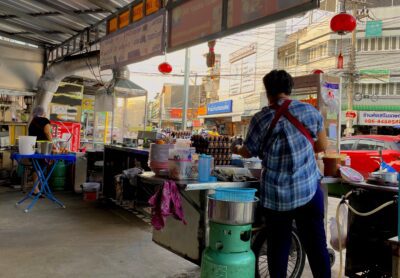 a country where you don’t speak the native language can cause a multitude of emotions varying from frustration to fascination, exhaustion to inspiration and isolation to happiness. These emotions fluctuate from day to day, hour to hour and minute to minute.
a country where you don’t speak the native language can cause a multitude of emotions varying from frustration to fascination, exhaustion to inspiration and isolation to happiness. These emotions fluctuate from day to day, hour to hour and minute to minute.
An inability to communicate with shopkeepers, restaurant servers and even just people in the street obviously makes life difficult. One’s state of mind when said difficulty occurs will be the determining factor in how they react. On some days the language barrier isn’t a bother, you get by with plenty of smiles and enjoy the tonal dancing of this alien dialect without a clue what’s going on. Other days are not so easy. It’s comfortable to speak to family and friends back home, to spend time with other English teachers. It’s safe to go to the same restaurant as always, just because they have an English menu and some of the staff can speak it too. But I bet that’s not why you’re here. The massive language barrier can be ominous and it’s natural to fear running into issues, but staying at home and avoiding them will not resolve anything and only lead to anxiety, irritation and more distance between yourself and your new home. There is a solution, it does require effort, but the reward is a key that unlocks possibilities and satisfaction otherwise unavailable.
I’m far from a linguist. Languages have never been something I’ve excelled in or particularly enjoyed, but living abroad has forced me out of my comfort zone and into situations where I’ve had no other choice other than to try. Learning is a challenge, it can be boring and frustrating, but possessing the ability to speak and understand basic words and survival phrases empowers one with the confidence to get out of the house and have experiences that lead only to further language development and more confidence. Listening is a great way to start, and you can begin the minute you step off the plane. Students and teachers at school, people in shops, restaurants and on the street are all great resources, better than any book or app. Keep an ear out for words and phrases that reoccur in conversation, if you notice them often then they must be important. With the help of someone who can speak the native language, or the internet, learn what you’ve heard and practice speaking it. Then, get out and use it.
Aggressive learning methods such as spending time on language apps, online courses or in the classroom are arguably more effective than my passive approach. However, I personally find it best to take it slowly and not overload myself. Too much information while juggling a new job in a new setting can cause unnecessary pressure and stress. Don’t feel like you need to be fluent, as pleasant as the ability may be. Providing you aren’t avoiding language encounters and are actively making an effort to be aware, then it will register in your mind and grow. I’m also a strong believer that one’s ability to learn greatly improves when doing so about something important to them, the same applies to language. If you love coffee, then learn how to order it. If you love history, then learn how to ask about it. If you love flirting, then learn how to do it, in Thai. Whatever is significant in your life will be a lot easier and more satisfying to learn about, and confidence gained from it precedes motivation to learn more. Simply, possessing the ability to converse with locals, however basic, will make your new home feel like somewhere you belong. The best way to do that is to learn a little and use it, speak. In the shop, in the bar, at school or wherever else you may find yourself, speak. However little, however badly pronounced, speak.
Getting involved: food, celebrations and work
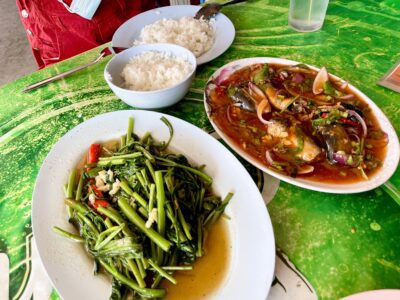 Access to transportation and the ability to communicate are essentials in life, without them it’s not easy to feel comfortable or confident about wherever you live. But as liberating as riding a moped or ordering your favourite dish in the local dialect may be, these alone do not qualify you to say you are completely assimilated in the culture of the land you now call home. To move to the next level and closer to quashing once and for all those uncomfortable feelings of being an outsider, one must do as locals do, eat what they eat and go where they go. Granted, it may never be possible to completely shake off that aura of otherness that is natural when living in a country not your own, but only by living like a local will you edge closer to becoming one.
Access to transportation and the ability to communicate are essentials in life, without them it’s not easy to feel comfortable or confident about wherever you live. But as liberating as riding a moped or ordering your favourite dish in the local dialect may be, these alone do not qualify you to say you are completely assimilated in the culture of the land you now call home. To move to the next level and closer to quashing once and for all those uncomfortable feelings of being an outsider, one must do as locals do, eat what they eat and go where they go. Granted, it may never be possible to completely shake off that aura of otherness that is natural when living in a country not your own, but only by living like a local will you edge closer to becoming one.
Food is far more than just energy and nutrition. Food is culture, history, feeling and memory. Food is personal to everyone and we all have different relationships with ingredients, etiquette and flavour depending on where we’re from and what we ate as children. This explains how when homesickness begins to linger, a trip to the supermarket followed by a few hours in the kitchen preparing a dish close to your heart that you ate at home, can take you right back to it. Food represents place, but more significantly it represents those who call that place home. This is why I believe in the importance of eating like a local, only by doing so is the ability to develop a deeper and binding connection with a place unlocked. If you really want to get to know your new home then eat what and where the locals do. Go to markets, street food stalls, restaurants or wherever the people are, for no other reason than the food is probably bloody delicious. Taste preference and dietary requirements can hinder one’s ability to dive completely into a new cuisine, I appreciate that, especially when one lacks the language ability to enquire about what exactly it is they’re about to eat. But I can speak from experience, it’s far better to try and not like than to never try at all. And seize the opportunity, combine brave eating with brave speaking. Ordering food was how I developed confidence and ability in speaking and listening. Two birds, one stone and a full belly. What could be better.
Within one’s home country it’s not difficult to know what’s going on. Whether by word of mouth or an advert in whatever form, you’re usually aware when a significant event is due to occur. 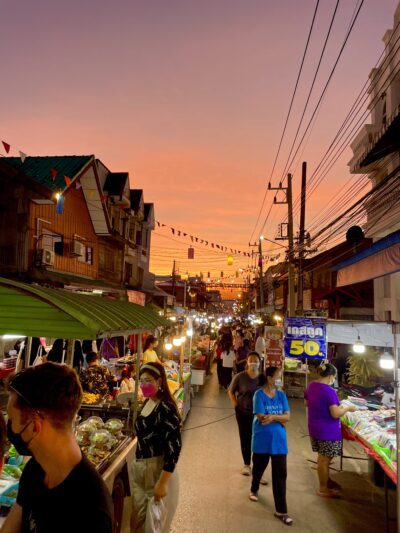 Things are quite different when living in a country whose language and culture is alien to you. Devoid of a network of friends and family, or the ability to speak to anyone at all, it’s easy to miss key events and celebrations. These significant events where great numbers of people gather are a fantastic way to develop deeper understanding of what’s important to people and their lives. Attending such events fast track one’s ability to nurture connection and grow empathy for people and place, ideal when familiarising oneself with a new land and those who call it home. Regardless of a lack of language ability, events where people congregate are places where culture is on display. Only at these events is it possible to witness in such a condensed setting what people do for fun, what makes them laugh, what they value as important and what they like to eat. They’re cultural explosions that shouldn’t be missed, but sadly they often are. To avoid being marked absent, I suggest keeping eyes and ears open, especially over the weekend. This sounds basic, but follow the herd. Parked cars, hordes of people, flashing lights and loud music should be a beacon. Look out for posters and enquire about them, ask English speaking friends and colleagues. Go where the people go.
Things are quite different when living in a country whose language and culture is alien to you. Devoid of a network of friends and family, or the ability to speak to anyone at all, it’s easy to miss key events and celebrations. These significant events where great numbers of people gather are a fantastic way to develop deeper understanding of what’s important to people and their lives. Attending such events fast track one’s ability to nurture connection and grow empathy for people and place, ideal when familiarising oneself with a new land and those who call it home. Regardless of a lack of language ability, events where people congregate are places where culture is on display. Only at these events is it possible to witness in such a condensed setting what people do for fun, what makes them laugh, what they value as important and what they like to eat. They’re cultural explosions that shouldn’t be missed, but sadly they often are. To avoid being marked absent, I suggest keeping eyes and ears open, especially over the weekend. This sounds basic, but follow the herd. Parked cars, hordes of people, flashing lights and loud music should be a beacon. Look out for posters and enquire about them, ask English speaking friends and colleagues. Go where the people go.
Stepping off the plane, wherever you may be, you’re there only because you possess a visa attained through having a job. And despite work not always being one’s sole motivation for moving to a new country, we couldn’t do it without the nine to five that differentiates us from a tourist passing through. However, that visa unaccompanied isn’t the transformative factor that sparks one into feeling like they really belong, more is needed. The power of transport, language and real effort to assimilate into the local culture is what will make a new home, home. But work should not be ignored. Spending a significant chunk of our lives in the hustle, we should try to make it as pleasant as possible. I believe the best way to do that is by growing good relationships with colleagues, and in the case of being a teacher, students too. Corridor exchanges, stationary borrowing and snack gifting are pleasantries only earned through effort, smiles and openness. These encounters, however small, add strength to one’s sense of affinity and make a bad day good. Your colleagues are also your first and most easily accessible window into culture, so use them. Speak and find out where to eat, what to do and where to go. People generally love to help, so don’t be afraid to ask if you need anything, advice or just guidance. A sense of belonging at work is the first step on the path to a sense of belonging within the new land you call home, without it, it’s a struggle.
Smile
Moving halfway across the world can be daunting, but it also has the potential to be the best thing you ever do. The confidence and self-belief gained from surviving an alien land shapes people, and sets them up for future success. Of course, nothing great is gained without difficulty. Applying oneself and overcoming problems that inevitably do arise is the key to personal profit and emotional prosperity. The first step towards achieving this is feeling at home within your new home, but this isn’t always easy. Passivity will not help achieve this goal and only through actively combatting negative feelings with actions will they be quelled. Openness, patience, understanding and enthusiasm, the right attitude is key. And you may already have it, I bet you do if you’re reading this. But whether you do or you don’t, I implore you to be aware of it, strive towards it and keep it up. And if you take nothing else away from my experiences and this article, if you only do one thing, always remember to smile. I know, life is hard and smiling doesn’t always come effortlessly. But when trying to make your new home, home, smile. When the international language of happiness is reciprocated without questions asked, you realise that although you’re very far from where you came from, people are people and smiles are free.
Ready to have a taste yourself? Explore our Thailand program page or submit an application

